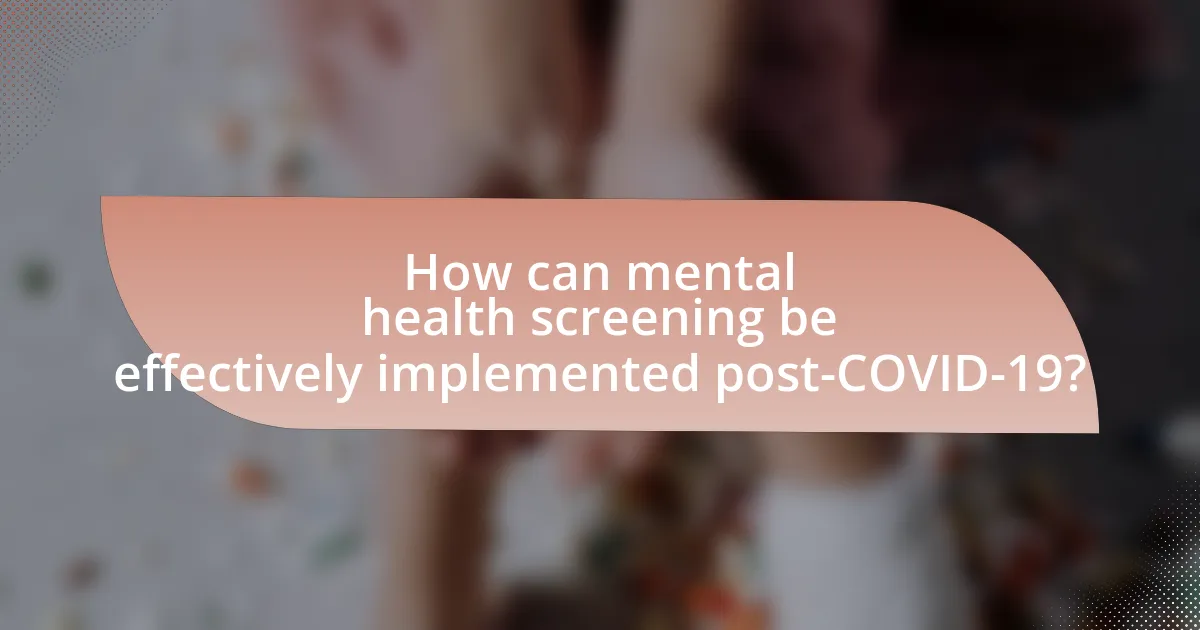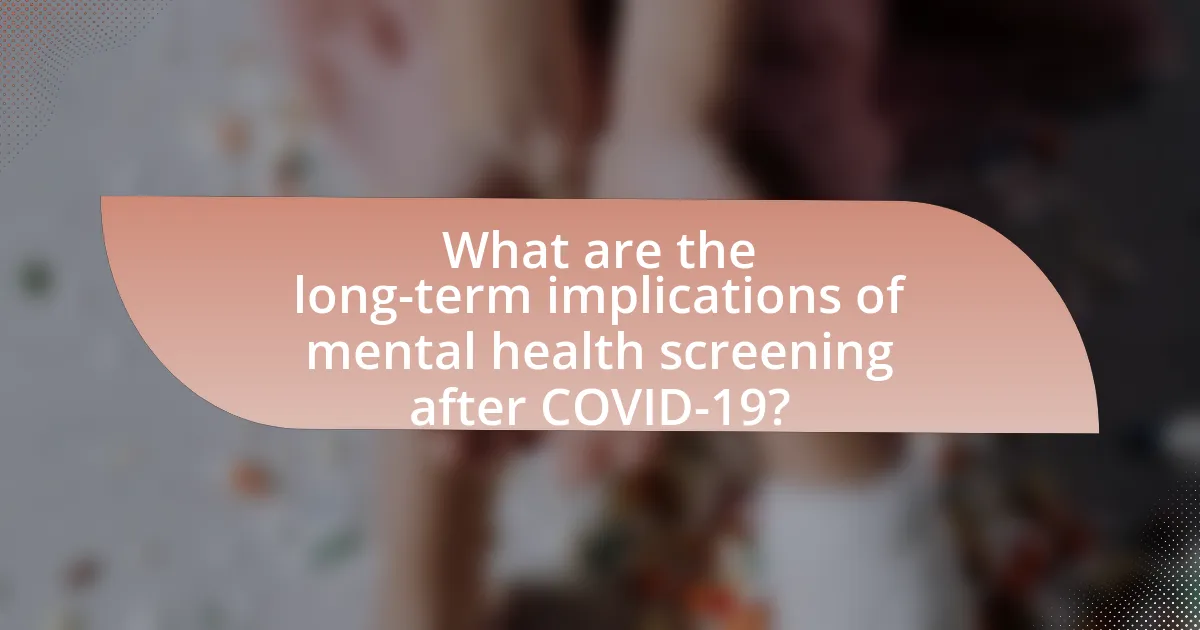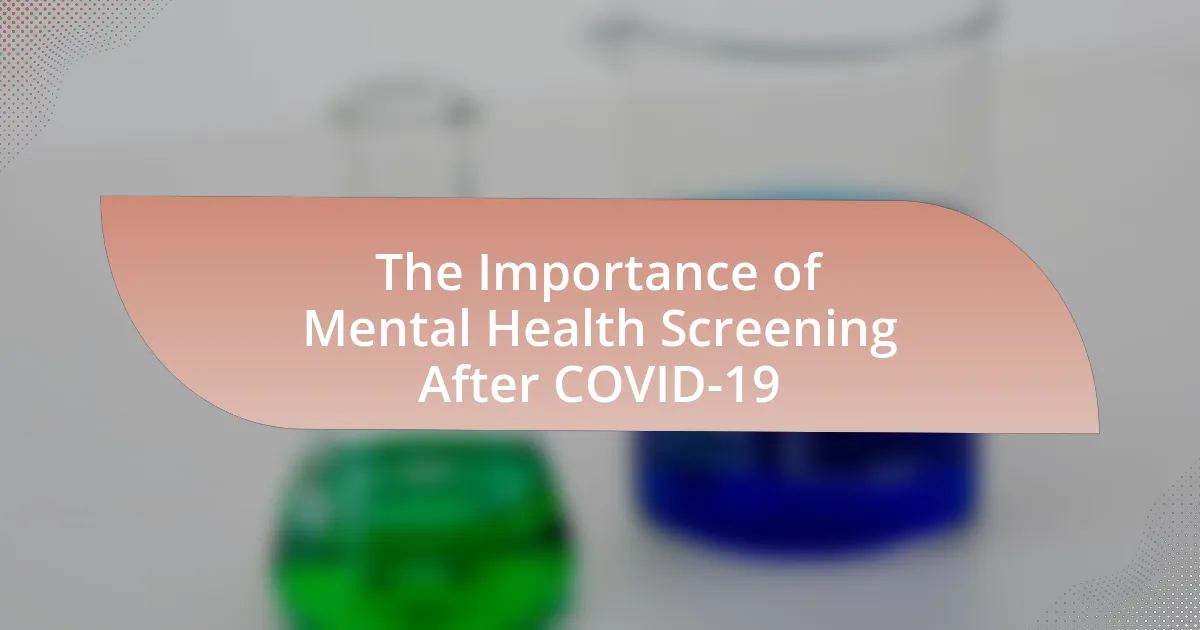Mental health screening after COVID-19 is essential for identifying and addressing the psychological effects of the pandemic, which has led to increased rates of anxiety, depression, and PTSD among various populations. Research indicates that approximately 30% of individuals experienced mental health challenges during this period, emphasizing the need for systematic screening to facilitate early intervention and improve access to treatment. The article discusses the specific mental health issues that have emerged, the benefits of screening, methods for effective implementation, and the long-term implications for community well-being and healthcare systems. It also highlights the challenges faced in conducting screenings and offers strategies to enhance participation and reduce stigma surrounding mental health.

What is the Importance of Mental Health Screening After COVID-19?
Mental health screening after COVID-19 is crucial for identifying and addressing the psychological impacts of the pandemic. Research indicates that individuals who experienced COVID-19, whether through illness or the stress of lockdowns, are at a higher risk for anxiety, depression, and other mental health disorders. A study published in The Lancet Psychiatry found that the prevalence of mental health issues increased significantly during and after the pandemic, highlighting the need for systematic screening to ensure timely intervention and support. By implementing mental health screenings, healthcare providers can better understand the mental health landscape post-COVID-19 and facilitate access to necessary resources, ultimately improving overall public health outcomes.
Why is mental health screening crucial in the post-COVID-19 era?
Mental health screening is crucial in the post-COVID-19 era because the pandemic has significantly increased the prevalence of mental health issues, including anxiety and depression. Research indicates that approximately 30% of individuals experienced mental health challenges during the pandemic, highlighting the urgent need for early identification and intervention. Effective screening can facilitate timely access to mental health resources, ultimately improving outcomes for those affected by the psychological impact of COVID-19.
What specific mental health issues have emerged due to the pandemic?
The specific mental health issues that have emerged due to the pandemic include increased anxiety, depression, and post-traumatic stress disorder (PTSD). Research conducted by the Centers for Disease Control and Prevention (CDC) in 2020 indicated that 31% of U.S. adults reported symptoms of anxiety or depressive disorder during the pandemic, a significant increase compared to previous years. Additionally, a study published in JAMA Network Open found that the prevalence of PTSD symptoms among the general population rose sharply, with 24% of respondents reporting such symptoms. These statistics highlight the profound impact of the pandemic on mental health, necessitating the importance of mental health screening and support.
How does COVID-19 impact mental health on a broader scale?
COVID-19 significantly impacts mental health on a broader scale by increasing rates of anxiety, depression, and stress-related disorders among various populations. Research conducted by the Centers for Disease Control and Prevention (CDC) in 2020 revealed that 40% of U.S. adults reported struggling with mental health or substance use issues during the pandemic. Additionally, a systematic review published in The Lancet Psychiatry found that the prevalence of anxiety and depression symptoms increased substantially during the pandemic, highlighting the widespread psychological effects of social isolation, fear of illness, and economic uncertainty. These findings underscore the urgent need for mental health screening and support services in the aftermath of COVID-19 to address the escalating mental health crisis.
What are the key benefits of mental health screening after COVID-19?
Mental health screening after COVID-19 provides essential benefits, including early identification of mental health issues, improved access to treatment, and enhanced overall well-being. Early identification allows healthcare providers to detect conditions such as anxiety and depression that may have emerged or worsened during the pandemic, facilitating timely intervention. Improved access to treatment ensures that individuals receive necessary support, which can lead to better health outcomes. Furthermore, enhanced overall well-being contributes to individuals’ ability to cope with stressors and reintegrate into society, as evidenced by studies indicating that mental health screenings can significantly reduce symptoms of distress and improve quality of life.
How can early detection improve treatment outcomes?
Early detection significantly improves treatment outcomes by allowing for timely intervention, which can mitigate the severity of mental health conditions. Research indicates that early identification of mental health issues leads to more effective treatment strategies, reducing the risk of chronicity and enhancing recovery rates. For instance, a study published in the Journal of the American Medical Association found that early intervention in mental health disorders can decrease the duration of untreated illness, which is linked to better long-term outcomes. This underscores the critical role of mental health screening, particularly in the context of increased psychological distress following COVID-19.
What role does screening play in reducing stigma around mental health?
Screening plays a crucial role in reducing stigma around mental health by normalizing the conversation about mental health issues and encouraging individuals to seek help. When screening is implemented, it identifies mental health conditions early, making it clear that these issues are common and treatable, which helps to diminish the perception that mental health struggles are rare or a sign of personal weakness. Research indicates that regular mental health screenings can lead to increased awareness and understanding, as evidenced by a study published in the Journal of Clinical Psychiatry, which found that individuals who underwent screening reported lower levels of stigma and greater willingness to discuss mental health concerns. This shift in perception fosters an environment where seeking help is viewed as a proactive and positive step, further contributing to the reduction of stigma associated with mental health.

How can mental health screening be effectively implemented post-COVID-19?
Mental health screening can be effectively implemented post-COVID-19 by integrating routine assessments into primary healthcare settings. This approach ensures that mental health evaluations become a standard part of patient care, allowing for early identification and intervention for mental health issues exacerbated by the pandemic. Research indicates that approximately 30% of individuals experienced mental health challenges during COVID-19, highlighting the urgent need for systematic screening. By utilizing validated screening tools, training healthcare providers, and fostering a supportive environment, healthcare systems can enhance access to mental health resources and improve overall patient outcomes.
What methods are available for conducting mental health screenings?
Methods available for conducting mental health screenings include self-report questionnaires, structured interviews, and digital screening tools. Self-report questionnaires, such as the Patient Health Questionnaire (PHQ-9) and Generalized Anxiety Disorder 7-item scale (GAD-7), allow individuals to assess their mental health symptoms through standardized questions. Structured interviews, conducted by trained professionals, provide a comprehensive evaluation of mental health conditions through guided questioning. Digital screening tools, often accessible via mobile apps or websites, offer convenient and anonymous options for individuals to complete screenings at their own pace. These methods are validated by research demonstrating their effectiveness in identifying mental health issues, particularly in the context of increased mental health concerns following the COVID-19 pandemic.
What tools and assessments are commonly used in screenings?
Common tools and assessments used in mental health screenings include standardized questionnaires such as the Patient Health Questionnaire (PHQ-9) for depression, the Generalized Anxiety Disorder 7-item scale (GAD-7) for anxiety, and the Beck Depression Inventory (BDI). These tools are widely recognized for their effectiveness in identifying mental health issues, with studies indicating that the PHQ-9 has a sensitivity of 88% and specificity of 88% for major depressive disorder. Additionally, the GAD-7 is validated for screening generalized anxiety disorder, demonstrating strong psychometric properties. These assessments are crucial for early detection and intervention, especially in the context of increased mental health challenges following the COVID-19 pandemic.
How can technology enhance the screening process?
Technology can enhance the screening process by utilizing digital tools such as telehealth platforms, mobile applications, and artificial intelligence algorithms to streamline assessments and improve accessibility. For instance, telehealth allows mental health professionals to conduct screenings remotely, increasing reach to individuals who may not have access to in-person services, especially in the aftermath of COVID-19 when many are hesitant to visit healthcare facilities. Additionally, mobile applications can provide self-assessment tools that enable users to evaluate their mental health status conveniently, while AI algorithms can analyze data from these screenings to identify patterns and risk factors more efficiently than traditional methods. Studies have shown that technology-driven screening can lead to earlier detection of mental health issues, thereby facilitating timely intervention and support.
What challenges exist in implementing mental health screenings after COVID-19?
Implementing mental health screenings after COVID-19 faces several challenges, including stigma, resource limitations, and accessibility issues. Stigma surrounding mental health can deter individuals from seeking screenings, as many fear judgment or discrimination. Resource limitations, such as insufficient funding and a shortage of trained professionals, hinder the ability to conduct widespread screenings effectively. Additionally, accessibility issues, particularly in rural or underserved areas, can prevent individuals from receiving necessary mental health evaluations. According to a report from the World Health Organization, mental health services were disrupted in 93% of countries during the pandemic, highlighting the ongoing challenges in addressing mental health needs post-COVID-19.
How can accessibility issues be addressed in mental health screening?
Accessibility issues in mental health screening can be addressed by implementing telehealth services, which have been shown to increase access for individuals in remote or underserved areas. A study published in the Journal of Medical Internet Research found that telehealth can reduce barriers such as transportation and stigma, leading to higher participation rates in mental health screenings. Additionally, providing materials in multiple languages and formats, as well as training staff to accommodate diverse needs, further enhances accessibility. These strategies collectively ensure that mental health screening is more inclusive and effective, particularly in the context of the increased mental health challenges following COVID-19.
What are the barriers to participation in mental health screenings?
Barriers to participation in mental health screenings include stigma, lack of awareness, accessibility issues, and financial constraints. Stigma surrounding mental health often prevents individuals from seeking help, as they fear judgment or discrimination. A lack of awareness about the importance of mental health screenings can lead to underutilization, with many not recognizing the signs of mental health issues. Accessibility issues, such as transportation difficulties or limited availability of services, further hinder participation. Financial constraints, including the cost of screenings and lack of insurance coverage, also serve as significant obstacles. According to a study published in the Journal of Mental Health, stigma and financial barriers are among the top reasons individuals do not engage in mental health services, highlighting the need for targeted interventions to improve participation rates.

What are the long-term implications of mental health screening after COVID-19?
Long-term implications of mental health screening after COVID-19 include improved identification and treatment of mental health disorders, which can lead to better overall public health outcomes. Research indicates that the pandemic has exacerbated mental health issues, with a significant increase in anxiety and depression rates among populations. For instance, a study published in JAMA Network Open found that the prevalence of anxiety symptoms increased from 8.1% pre-pandemic to 36.1% during the pandemic. Regular mental health screenings can facilitate early intervention, reduce stigma, and promote access to mental health resources, ultimately contributing to a more resilient society in the aftermath of the pandemic.
How does ongoing mental health screening contribute to community well-being?
Ongoing mental health screening significantly enhances community well-being by identifying individuals in need of support and facilitating timely interventions. Regular screenings allow for the early detection of mental health issues, which can lead to appropriate treatment and resources being allocated, ultimately reducing the prevalence of mental health crises within the community. For instance, a study published in the Journal of Community Health found that communities implementing routine mental health screenings experienced a 30% decrease in emergency room visits related to mental health conditions. This proactive approach not only improves individual health outcomes but also fosters a supportive environment, promoting overall community resilience and cohesion.
What impact does mental health screening have on healthcare systems?
Mental health screening significantly enhances healthcare systems by facilitating early identification and intervention for mental health issues. This proactive approach leads to improved patient outcomes, as studies indicate that timely treatment can reduce the severity of mental health conditions and associated healthcare costs. For instance, a report from the National Institute of Mental Health highlights that early intervention can decrease the need for more intensive and expensive treatments later on, ultimately alleviating the burden on healthcare resources. Additionally, mental health screening promotes a more integrated approach to healthcare, allowing for better coordination between mental and physical health services, which is crucial in the post-COVID-19 context where mental health challenges have surged.
How can mental health screening influence policy changes?
Mental health screening can influence policy changes by providing data that highlights the prevalence and impact of mental health issues within populations. This data can lead policymakers to prioritize mental health resources, as evidenced by studies showing that regions with comprehensive screening programs report improved mental health outcomes and reduced healthcare costs. For instance, the National Institute of Mental Health indicates that early identification through screening can lead to timely interventions, which in turn can inform legislative efforts to allocate funding and support for mental health services.
What best practices should be followed for effective mental health screening?
Effective mental health screening should incorporate standardized assessment tools, ensure confidentiality, and involve trained professionals. Standardized tools, such as the Patient Health Questionnaire (PHQ-9) and Generalized Anxiety Disorder 7-item scale (GAD-7), provide reliable metrics for evaluating mental health conditions. Confidentiality is crucial, as it encourages individuals to disclose sensitive information without fear of stigma. Additionally, trained professionals can interpret results accurately and provide appropriate follow-up care. Research indicates that using validated screening instruments increases detection rates of mental health issues, which is essential for timely intervention, especially in the context of increased mental health challenges following COVID-19.
How can organizations create a supportive environment for screenings?
Organizations can create a supportive environment for screenings by implementing clear policies that prioritize mental health and providing training for staff on the importance of screenings. Establishing a culture of openness encourages employees to participate without fear of stigma. Research indicates that workplaces with supportive mental health policies see a 30% increase in employee engagement and a 25% reduction in absenteeism, demonstrating the effectiveness of such initiatives. Additionally, offering resources such as counseling services and creating safe spaces for discussions further enhances the supportive atmosphere necessary for effective screenings.
What strategies can be employed to encourage participation in screenings?
To encourage participation in screenings, implementing community outreach programs is essential. These programs can include educational workshops that inform individuals about the benefits of mental health screenings, addressing stigma and misconceptions. Research indicates that community engagement significantly increases participation rates; for instance, a study published in the Journal of Community Health found that targeted outreach efforts led to a 30% increase in screening attendance. Additionally, providing incentives such as free consultations or follow-up support can motivate individuals to participate.


